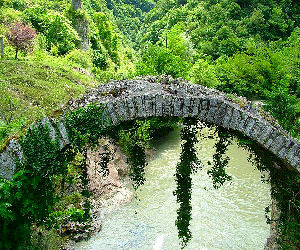The Kremlin’s recent moves show that Russia is not going to take a step back from its ambitious plans to be a superpower and will “punish” neighboring states that rebel against its “sphere of influence.”
After a series of harsh statements to the Georgian leadership and President Mikheil Saakashvili, Russian President Dmitry Medvedev initiated a bill to create a legal basis to use Russian troops beyond Russian borders.
According to the Kremlin, the draft law will supplement Clause 10 of the Federal Law On Defense with Paragraph 21, specifying that the Russian armed forces can be used in operations beyond Russia’s borders for the following purposes: to counter an attack against the Russian armed forces or other troops deployed beyond Russia’s borders; to counter or prevent aggression against another country; to protect Russian citizens abroad; and to combat piracy and ensure the safe passage of shipping.
Medvedev did not hide that his initiative is linked to the Georgian-Russian war last August. Deputy Head of the Duma’s Security Committee Viktor Ilyukhin told the Moscow Times that the bill aims to streamline legal procedures for military deployments and “press Georgia’s sensitive spots.”
According to Ilyukhin, the new provisions allowing Russia to defend foreign forces and countries would apply to states that have signed military cooperation pacts with Russia.
Both Georgian breakaway regions have signed such treaties.
Real threat or bluffing
The Kremlin also aims to punish Ukraine for its efforts to integrate into Western alliances. Medvedev’s address to Ukrainian President Viktor Yushchenko this week made clear the Kremlin’s intolerance of the current government and its aspirations to NATO, while indicating new attempts by Moscow to interfere in Ukraine’s internal affairs.
“This statement is a direct interference in the internal politics of Ukraine as it regards not only bilateral Russian-Ukrainian relations, but also issues that are internal issues of Ukraine, in particular issues of external policy,” Ukrainian Deputy Irina Gerashchenko was quoted by NEWSru.ua as saying.
Medvedev said relations will soon resume on a fundamentally different level.
“There can be no doubt that the multifaceted ties between Russia and Ukraine will resume on a fundamentally different level – that of strategic partnership – and this moment will not be long in coming,” Medvedev said in his video blog on the Kremlin’s Web site. “I hope that the new leadership of Ukraine will be ready for the breakthrough.”
The Russian president topped the list of Kiev’s alleged hostile actions toward Russia by mentioning arms deliveries to Georgia. Accusing Ukraine’s government of being “anti-Russian” and delaying the sending of an ambassador to Kiev, Medvedev said Ukraine shares responsibility for the deaths of Russian soldiers.
“The leadership in Kiev took an openly anti-Russian stance following the military attack launched by the Saakashvili regime against South Ossetia,” Medvedev said.
“Ukrainian weapons were used to kill civilians and Russian peacekeepers.”
The president’s attacks against Kiev received widespread coverage in Tbilisi with a row of Georgian officials seeing the address as an attempt to intimidate Ukraine from continuing along its Western path.
Although relations between Kiev and Moscow have been strained in recent years and the Kremlin’s accusations have come as no surprise, Medvedev’s tone emphasized Russia’s ability to cause once more destabilization in a neighboring country. Crimea might be a target for realizing the Kremlin’s scenario.
Expert Irakli Sesiashvili told Interpressnews that after the military build ups in Georgia’s breakaway regions, Russia’s main target is Crimea. He said at this stage, the Kremlin will avoid using force, but will use Russian citizens there to organize rallies demanding Russian fleet stay in Crimea after 2017.
Center for European Integration Studies President Vasili Tchkoidze told Georgia Today that Ukraine was able to prevent a “well-planned Russian provocation” based on the complex ethnic map in Crimea. This was a key reason for Russia’s anger against Ukraine and its leadership, he said.
“For attempting such a provocation, a famous diplomatic scandal ensued in Ukraine when two Russian diplomats were expelled from the country,” Tchkoidze said. “These individuals attempted to create serious provocations on an ethnic base. Afterwards Russia presumably would have tried through political or military mechanisms to become involved in that conflict. This failure seemed to trigger Russia’s anger.”
However, he added that Russia does not seem to be stepping back from Crimea and is searching for a way to maintain a military presence in the region. The country might interfere in ethnic tensions in Crimea using the pre-text of “defending its citizens,” he said.
Medvedev said that Russia continues “to experience problems caused by a policy aimed at obstructing the operations of its Black Sea Fleet.”
Medvedev in search of new Ukrainian leader
Local media immediately called Medvedev’s speech shortly ahead of the Ukrainian presidential elections a “diplomatic scandal.”
Analysts in Tbilisi and Kiev said the statement is an attempt to influence the pre-election campaign.
“This is a tough diplomatic demarche,” Ukrainian think-tank Penta head Vladimir Fisenko was quoted as saying by Reuters. “This is a signal for the presidential campaign aimed against Yushchenko. It is also a signal to all Ukrainian politicians that it is time for Kiev to change its course.”
Viktor Yanukovych, who heads the Party of Regions backed by Moscow during the 2004 elections, said it is not worth counting on improving Ukraine-Russia ties under the current government. He added that in the event that the party comes to power, it will first try to revive “good neighborly, equal and mutually beneficial relations” with Russia.
Kiev responded on Thursday.
Yushchenko wrote to Medvedev in a letter yesterday, saying he is “very disappointed” with the unfriendly character of the Russian president’s address.
“I cannot disagree that there are serious problems in the relations between our countries, but it is surprising that you completely rule out Russia’s responsibility for this,” Yushchenko wrote.
Discussing Ukraine’s position toward the events in Georgia last year, Yushchenko said it coincides with the position of practically all countries and represents respect for the sovereignty, territorial integrity and firmness of Georgia’s and all other nations’ borders. He added that Russian reproaches of arms deliveries to Georgia are groundless, and stressed that the country is not the object of any international embargoes or sanctions on arms deliveries.
Yushchenko has little chance for victory in the upcoming elections. However, some experts in Ukraine said Medvedev’s statement will backfire and increase Yushchenko’s rating over the Moscow-backed Yanukovych.
“Moscow takes risky steps,” Georgian Diplomatic Academy Rector Soso Tsintsadze told the Rezonansi newspaper. “It is not excluded that such an imperialistic style will increase anti-Russian moods in Ukraine and movements will commence.
It is also not excluded that pro-Russian forces would incite an alarm, but there are forces in Kiev and western Ukraine to withstand such provocation. Moscow knows this well.”
Tchkoidze said even in the case of Yanukovych’s victory, radical changes to Ukraine’s foreign policy are not expected.
“Yanukovych’s victory naturally will change Ukraine’s foreign course, but I do not think it will change by 180 degrees,” he said. “There would be some corrections, but the majority of Ukraine is for the country’s integration into Europe. So whoever will be the new leader of Ukraine, he should take into consideration this reality.”
According to Tchkoidze, in the event that Ukraine veers from the path of Euro-Atlantic integration, Georgia would need to invest more efforts to maintain Western interests in the region. However, it hardly will affect the country’s aspirations for European and NATO integration, he said.
Nina Akhmeteli
14.08.2009
Russianfascism's Blog
Saturday, August 15, 2009
Subscribe to:
Post Comments (Atom)










No comments:
Post a Comment